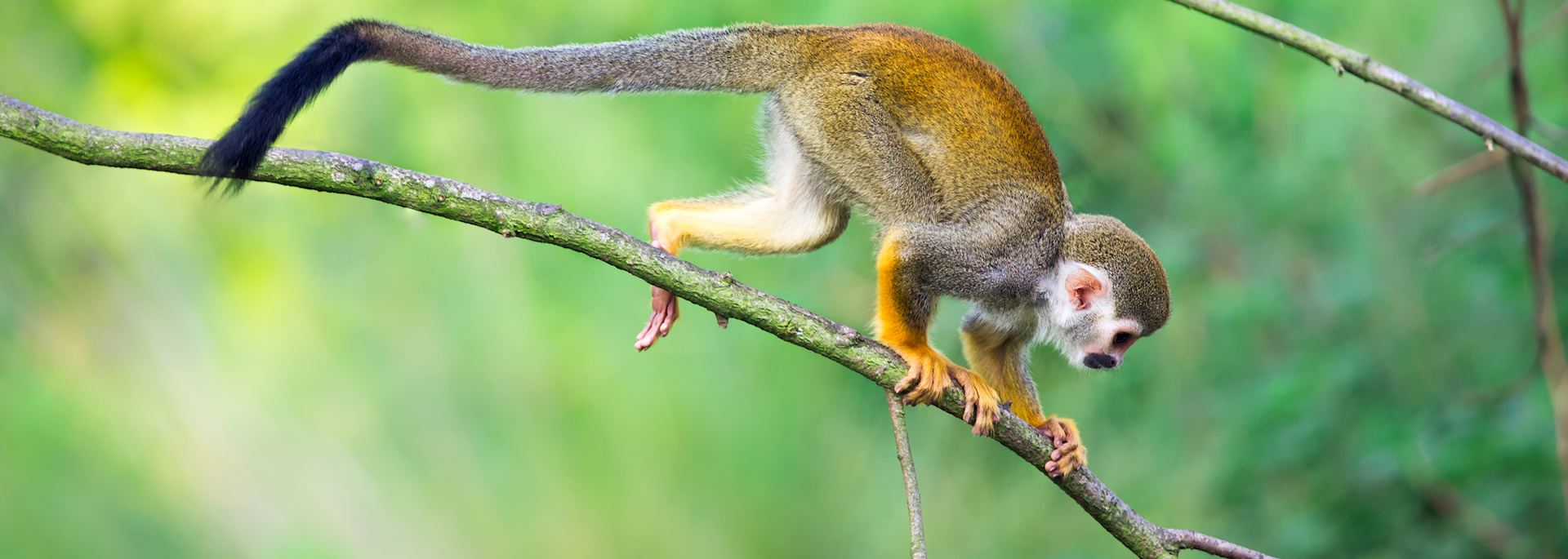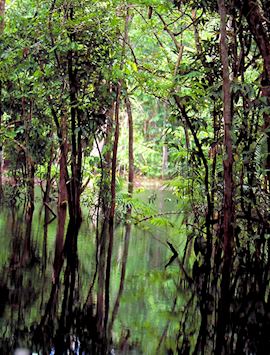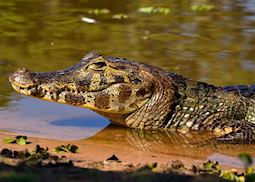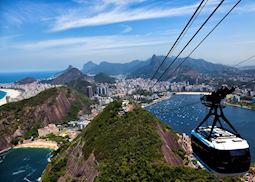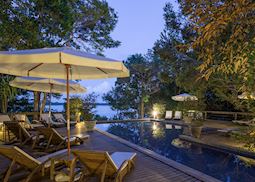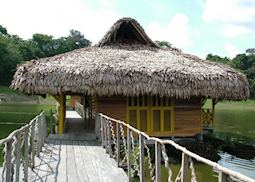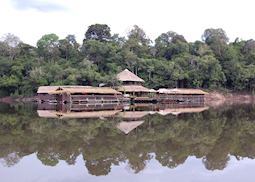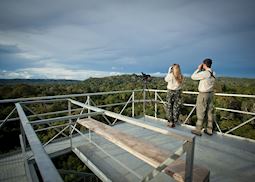Jump to:
The Brazilian Amazon. The very words conjure up the image of an immense network of wild vegetation, waterways and lakes. From the air, this jungle looks impenetrable, and houses a tenth of the world’s plant and animal species, with many more yet undiscovered.
Brazil has the lion’s share of this huge biome, but experiencing its Amazon comes with some caveats. The town of Manaus, the gateway to many rainforest lodges, has gradually encroached on the forest over the years. It’s caused animals to scamper off into the undergrowth to parts where visitors never set foot.
This means that, although staying at northern Amazon lodges can be a great way to get a feel for the rainforest’s ecosystem, if you’re eager to spot wildlife you’re best going to the less developed southern Amazon — specifically, to Cristalino Jungle Lodge.
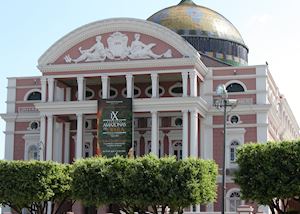 If you’re in the northern Amazon, your first experience might be setting foot in Manaus: a frontier-like town, with an incongruous (but intriguing) wedding cake of an opera house. You’ll set sail from Manaus for your jungle lodge.
If you’re in the northern Amazon, your first experience might be setting foot in Manaus: a frontier-like town, with an incongruous (but intriguing) wedding cake of an opera house. You’ll set sail from Manaus for your jungle lodge.
En route, you’ll pass two rivers, the Rio Solimões and the Rio Negro. They merge to form what we know as the Amazon River, which is 10 km (6.2 miles) wide even here, 1,600 km (994 miles) from the Atlantic Ocean.
Their meeting, however, is a little unusual: the yellow waters of the Solimões run alongside the black waters of the Negro for 6 km (4 miles) before converging. Some lodges farther away from Manaus sit right on the Rio Negro: its acidic waters attract fewer mosquitoes.
To stand a chance of seeing more species in the northern Amazon (including several monkey species), you’re best heading to a lodge around three hours from Manaus.
But, even if you stay closer, you’re quickly enveloped in the highly sensory world of the rainforest.
Days begin with the throaty calls of howler monkeys and perhaps the distant chug-chugging of a motorboat, as locals start going about their daily business. As dawn breaks, you can watch sheets of mist rising from the water. At night, you fall asleep to a thousand twangling sounds humming about your ears: the thrum of insects and cries of nocturnal creatures.
Wherever you go, the Amazon is a boon for botanists: you can boat amid giant waterlilies, and take medicinal plant walks with expert guides. They’ll tell you about the healing properties of ginger and kapok trees, among a multitude of other plants.
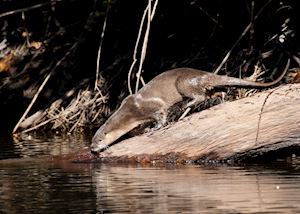 If your priority is seeing wildlife, you’re best heading to Cristalino Jungle Lodge, in the southern Amazon. You’ll fly to Alta Floresta rather than Manaus, a remote settlement, before journeying deeper into the forest. Cristalino owns a lot of the land it sits on and contributes to reforestation efforts.
If your priority is seeing wildlife, you’re best heading to Cristalino Jungle Lodge, in the southern Amazon. You’ll fly to Alta Floresta rather than Manaus, a remote settlement, before journeying deeper into the forest. Cristalino owns a lot of the land it sits on and contributes to reforestation efforts.
Given the lodge’s isolation, wildlife is much more prolific. You’re likely to see four monkey species (squirrel, howler, spider and capuchin) as well as many butterflies and birds, and potentially capybara. If you travel upstream, you might see giant river otters — great hulking beasts that are over double the size of a North American river otter.
The southern Amazon combines well with a trip to Brazil’s northern Pantanal, a wetland region that’s also a wildlife heartland.
who's been there

Start planning your tailor-made trip to the Amazon Rainforest by contacting one of our Brazil specialists
-
617-223-4521617-223-4910
- Make an inquiry
Suggested itinerary featuring the Amazon Rainforest
This sample itinerary will give you an idea of what is possible when you travel in the Amazon Rainforest, and showcases routes we know work particularly well. Treat this as inspiration, because your trip will be created uniquely by one of our specialists.
Places near the Amazon Rainforest
- Manaus 10 miles away
Our expert guides to exploring the Amazon Rainforest
Written by our specialists from their own experiences of visiting the Amazon Rainforest, these guides will help you make the most of your time there. We share both our practical recommendations and the best ways to appreciate the Amazon Rainforest at its best.
-
Best of Brazil: tips for a first-time visitor ![Caiman lounging around in the Brazilian Pantanal, Brazil]()
Best of Brazil: tips for a first-time visitor
Best of Brazil: tips for a first-time visitor
Brazil is the fifth largest country in the world and one of the most diverse, with a huge array of landscapes, people and culture. Discover our top tips for the best places to go on a first-time visit to this magnificent country.
Read this guide -
What to do in Brazil: our highlights guide ![The view from Sugarloaf Mountain, Rio de Janeiro]()
What to do in Brazil: our highlights guide
What to do in Brazil: our highlights guide
Country specialist, Georgia, chooses some of her favorite things to see and do and where to stay in Brazil. Highlights include spending time in Rio and Salvador, the Amazon and the Pantanal’s wetlands, the best way to see the Iguaçu Falls and her pick of Brazil’s many beaches.
Read this guide
Accommodation choices for the Amazon Rainforest
We've selected a range of accommodation options for when you visit the Amazon Rainforest. Our choices usually come recommended for their character, facilities and service or location. Our specialists always aim to suggest properties that match your preferences.
-
![Anavilhanas Lodge]()
Anavilhanas Jungle Lodge
Amazon Rainforest -
![Uakari Floating Lodge]()
Uakari Floating Lodge
Amazon Rainforest -
![Amazon Eco Lodge, Amazon Eco Lodge]()
Amazon Lodge
Amazon Rainforest -
![Canopy Tower at Cristalino]() Responsible ChoiceWe've hand-selected a range of tours and stays across the world that go above and beyond to be a force for good by supporting local businesses, educating staff, challenging local norms, or promoting conservation and biodiversity efforts. Your Responsible Choice helps increase the positive impact of your trip.
Responsible ChoiceWe've hand-selected a range of tours and stays across the world that go above and beyond to be a force for good by supporting local businesses, educating staff, challenging local norms, or promoting conservation and biodiversity efforts. Your Responsible Choice helps increase the positive impact of your trip.Cristalino Jungle Lodge
Amazon Rainforest
